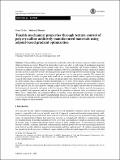Tunable mechanical properties through texture control of polycrystalline additively manufactured materials using adjoint-based gradient optimization
Author(s)
Gu, Grace Xiang; Buehler, Markus J
DownloadAccepted version (1.680Mb)
Open Access Policy
Open Access Policy
Creative Commons Attribution-Noncommercial-Share Alike
Terms of use
Metadata
Show full item recordAbstract
Polycrystalline materials can be characterized by the preferred orientation of grains within a material, otherwise known as texture. It has been shown that texture can affect a wide range of mechanical properties in metallic materials, including elastic moduli, yield stress, strain hardening, and fracture toughness. Recent advances in additive manufacturing of metallic materials allow for controlling the spatial variation of texture and thus provide a path forward for controlling material properties through additive manufacturing. This paper investigates the benefits, in terms of mechanical performance, of varying texture spatially. We examine the material properties of a hole in a plate under load and use an adjoint-based gradient optimization algorithm coupled with a finite element solver. The method of adjoints allows for efficient calculation of design problems in a large variable space, reducing overall computational cost. As a first step to general texture optimization, we consider the idealized case of a pure fiber texture where the homogenized properties are transversely isotropic. In this special case, the only spatially varying design variables are the angles that describe the orientation of the homogenized material at each point within the structure. Material angles for both a spatially homogeneous and a spatially heterogeneous material are optimized for quantities of interest, such as compliance and von Mises stress. Additionally, the combined effects of elasticity tensor and material orientation on optimized structures are explored, as the additive manufacturing processes can potentially vary both. This work paves a way forward to design metallic materials with tunable mechanical properties at the microstructure level and is readily adapted to other materials.
Date issued
2018-07Department
Massachusetts Institute of Technology. Department of Mechanical Engineering; Massachusetts Institute of Technology. Department of Civil and Environmental EngineeringJournal
Acta Mechanica
Publisher
Springer Science and Business Media LLC
Citation
Gu, Grace X. and Markus J. Buehler. “Tunable mechanical properties through texture control of polycrystalline additively manufactured materials using adjoint-based gradient optimization” Acta Mechanica, vol. 229, no. 10, 2018, pp. 4033-4044 © 2018 The Author(s)
Version: Author's final manuscript
ISSN
0001-5970